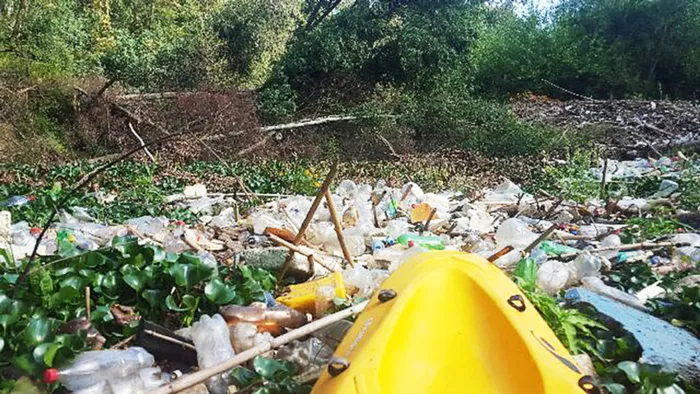
Bergriver. 151022. Refuse floating in Bergriver. Pic supplied Bergriver. 151022. Refuse floating in Bergriver. Pic supplied
Melanie Gosling
Environment Writer
EXTREME swimmers Andrew Chin and Henko Roukema, who set off last week to swim the Berg River as part of the Rivers for Life programme, have packed up and gone home because three members of the team became ill – apparently from the polluted water.
Chin, who has faced icy waters and treacherous seas in his swim around Cape Point, Cape Horn and an “ice mile” in the Antarctic, was defeated by the Berg River in his home province.
“It all became a bit much when the third member of our team got sick. Henko had been sick and then the two back-up guys were also vomiting and had diarrhoea.”
The team drank river water that had first been filtered by a mechanism designed to remove 99 percent of all bacteria.
“I don’t think it failed, I think that maybe river water got on the piece you sip on. And of course it got on our hands and faces.”
Chin launched the Rivers for Life programme in January when he and Toks Viviers swam 200km in 10 days down the Wilge River in the Free State. Chin, from Cape Town, aims to swim between 100km to 350km in a river in each province over three years, swimming two rivers a year.
The purpose is to highlight the deteriorating state of the country’s rivers.
Chin was shocked by the level of pollution in the Berg River.
“To me this is dire. The Berg River affects the lives of 4 million people. I was horrified by what I saw, disgusted in fact.”
His idea had been to swim from Franschhoek to the West Coast. The pair hiked to the source at Assegaaibosch Kloof on Monday last week, swam across the Berg River dam and then had to hike next to the river because the water level was so low.
When the group pulled out at the weekend, they had covered 135km, of which they had swum only 21km.
There was sewage pollution in the river between Paarl and Wellington, apparently because of the current upgrading of the sewerage works in Wellington.
“We were advised not to swim in a 30km stretch there because of the sewage pollution. But what we saw later goes way beyond that. The river was just chocked with rubbish – plastic bottles, packets, you name it. Every day people did that, you can’t blame the authorities for that.
“And all that plastic and rubbish is going to go down the river and will end up in the sea, causing problems there.”
They also encountered leeches in the Misverstand dam.
“From a swimming perspective it was a failure, but if people hear what we are saying about the pollution, then I suppose that is successful.”
The Wildlife and Environment Society gave them tools to monitor the water quality along the length of the Berg River by conducting tests at regular intervals.
melanie.gosling@inl.co.za